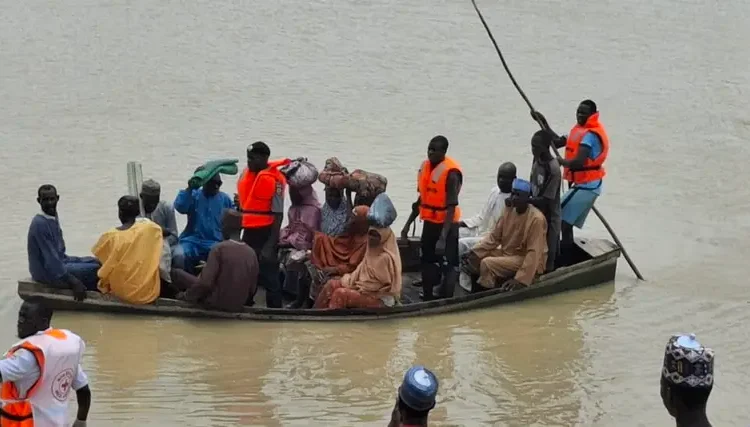The National Emergency Management Agency (NEMA), in a move to bolster Nigeria’s disaster preparedness, conducted a “Full-Scale Flood Response Simulation” exercise in Wudil Local Government Areas, Kano State.
The Agency’s Director-General, Mrs Zubaida Umar, during the simulation exercise on Saturday, emphasised the critical importance of readiness in the face of Nigeria’s recurring flood disasters.
According to her, recent predictions by the Nigerian Meteorological Agency (NIMET) and the Nigeria Hydrological Services Agency (NIHSA) have identified Kano, Jigawa, Sokoto, Kebbi, and Zamfara as high-risk flood zones for 2025.
“The urgency of the exercise with downstream impact in Kano, Jigawa, Yobe States was underscored by the devastating flood that recently struck Mokwa in Niger State, serving as a stark reminder of the dangers posed by natural disasters.
“The exercise is to simulate a forced water release from Tiga, Challawa, and Bagauda Dams to test emergency preparedness for potential dam-induced flooding along River Kano,” she said.
Umar explained that the simulation was designed not only to test existing emergency plans and protocols but also to identify gaps and enhance coordination among all stakeholders.
“Today, we are simulating a crisis so that we are better prepared to save lives when it becomes a reality. Preparedness saves lives.
“The simulation marks a significant step forward in Nigeria’s ongoing efforts to build resilience against the ever-present threat of flooding.
“Our ability to anticipate, respond, and recover quickly from disasters depends largely on how well we train and work together before disaster strikes.”
She encouraged all participants to approach the exercise with professionalism and learning mindset, stressing that the lessons learned would be invaluable for future disaster response efforts.
Umar expressed her gratitude to all involved for their dedication and commitment to safeguarding lives and communities.
Gov. Abba Yusuf reiterated the government’s unwavering commitment to the safety, well-being, and resilience of Kano’s citizens in the face of environmental and climate-induced challenges.
“It is important to underline the emphasis being made by the D-G NEMA, that disasters occur, and if, God forbid, a disaster happens here in Wudil, we are expecting the people locally here to start responding aggressively to any eventuality in an informed and coordinated manner,” he said.
He noted that the increasing frequency and severity of floods, particularly from Bagauda, Chalawa and Tiga Dams, underscores the urgency for active planning and collaboration.
According to him, while these dams overflow due to heavy rainfall, the consequences can be devastating to loss of lives, destruction of farmland and homes, displacement of communities and the destruction of livelihoods.
The governor outlined ongoing government initiatives, including the desilting and clearing of drainages, upgrading infrastructure, early warning campaigns, and strengthening local emergency response teams.
Yusuf said the responsibility does not rest with the government alone, called on all citizens, especially those living in flood-prone areas, to heed early warnings, cooperate with authorities, and take personal precautions to stay safe.
He commended the efforts of the Kano State Emergency Management Agency, NEMA, and all partner organisations for their dedication to disaster risk reduction.
On his part, Senator Mustapha Khabib, representing Jigawa Southwest, in an interview with newsmen, expressed confidence in the local communities’ disaster preparedness.
He described the exercise as “very impressive and well organised, noting the cooperation and support of the local population.
In his words, “With this simulation exercise and the ongoing sensitisation efforts regarding flood risks, I am confident that these local communities are well mobilised and adequately trained on how best to provide rescue and aid services.”
The senator noted that prior to the drill, he had concerns about the level of readiness but was reassured by the professionalism and enthusiasm displayed throughout the exercise.
“This exercise has really stimulated my interest and infused confidence in me. It is very pleasing to see how engaged people are, especially those living alongside the riverbanks.
“We are going back confident that if a flood occurs, we are not just praying it won’t happen, but we are prepared to respond effectively,” he said.
Khabib expressed hope that the lessons learned from the exercise would be applied not only in Jigawa Southwest but also in other vulnerable communities across the region.
The News Agency of Nigeria (NAN) reports that the simulation exercise included practical demonstrations of rescue operations, aid distribution, and community mobilisation strategies.
It aimed to enhance the resilience of flood-prone communities and ensure swift, coordinated responses in the event of an actual disaster.
The successful drill marks a significant step forward in disaster management efforts in Jigawa State, reinforcing the importance of community involvement and government collaboration in safeguarding lives and property from natural calamities.


